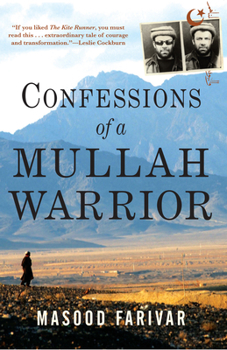Confessions of a Mullah Warrior
Select Format
Select Condition 
Book Overview
"If you liked The Kite Runner, you must read this riveting, firsthand account by one of the real Afghan mujahideen . . . An extraordinary tale." --Leslie Cockburn Masood Farivar was ten years old when... This description may be from another edition of this product.
Format:Paperback
Language:English
ISBN:0802144543
ISBN13:9780802144546
Release Date:February 2010
Publisher:Grove Press
Length:336 Pages
Weight:0.70 lbs.
Dimensions:0.9" x 5.7" x 8.2"
Customer Reviews
4 ratings
Great Book!
Published by Thriftbooks.com User , 14 years ago
This is one of the few books I've had a hard time putting down. Was fascinated by Farivar's spiritual adventure and humbled by his willingness to again serve his homeland after years of immersion into the American culture. Farivar helped me to see recent Afghan history through a completely different pair of glasses.
Great, enjoyable read for anyone looking to understand a misunderstood part of the world
Published by Thriftbooks.com User , 14 years ago
Masood Farivar provides an enjoyable and digestible first hand account of a complicated region and nation. His upbringing at the crossroads of tribal life and what was then the closest thing in Afghanistan to 'suburbia' life, combined with his journey to becoming a warrior fighting communism in the 1980s would serve well for any literature. Yet, Masood adds the cherry on top; he left Afghanistan for a Harvard education in the 1990s, and then returned to his country a couple years ago. As such, he applies a unique lens that provides a viewing angle for "western" readers. The outcome is a great read!
Understanding Afghans
Published by Thriftbooks.com User , 14 years ago
This book has given me a new understanding of Afghans, their faith, motivations, and family life. Second, it is a necessary primer on recent Afghan political history, without which it is impossible to make sense out of current events in that romote land.
Interesting
Published by Thriftbooks.com User , 15 years ago
Masood Farivar's book tells of his upbringing in Afghanistan, refugee life in Pakistan, service in the mujahideen, education in the U.S., and ultimate return to Afghanistan. It's main value is serving as a window into another culture. One particularly interesting point was his observation that Afghans saw their struggle vs. the Russians as a jihad (holy war) fought to liberate their country. Arabs, on the other hand, were seen by Afghans as war tourists who had bought their way into the country, saw the Afghans as lesser Muslims, and were seeking heavenly rewards (martyrdom). Some would even have themselves tied to trees in bombarded areas in hopes of being killed. Another particularly interesting segment covered his finding a family manuscript that begins in 1582 - fighting to convert the last non-Muslim pocket of Afghanistan. Then in continues on to 20th century fighting in defense of the king, his predecessors attending madrassahs (originally developed during the 11th century, two centuries before European counterparts that eventually evolved into secular institutions of higher learning), the conflict in Afghanistan between secular and religious education in the mid-1950s. Masood's father was a Soviet-educated petroleum engineer, and only a mild observer of Islam - thus, the forays and "culture shock" later experienced by Masood were far less than likely for others, and the opportunities greater. For example, 95% of the Afghan population in the mid-1970s was illiterate. Communists took over Afghanistan in 1978 - it first it was benign, then people began disappearing and a reign of terror followed, with parents spying on children, etc. Resistance developed, followed by a Russian invasion. In the third year of the occupation (1982), resistance fighters again formed - the mujahideen. Masood and his family escaped to Pakistan, where he was introduced to Islamic fundamentalism by a relative living in Pakistan, and Masood became a devout Muslim and attended an Arab-funded (Saudi Arabia) madrassah. While much stricter than Afghan traditions, it was not as strict as Wahhabism. Besides studying the Koran, Masood learned Arabic grammar - key to understanding the Koran and its phraseology. At 18 Masood left to join the mujahideen in Tora Bora, despite his parents objections. The tide of battle had already turned, thanks to Stinger missiles. Masood learned how to fire AK-47s, etc., and the importance of good relations with villagers by patrolling their homes, spending nights in their mosques, and giving them a sense of security. Return benefits included food, shelter, and intelligence. Often competing mujahideen groups fought over territory, creating greater suffering for the populace. Masood's group had foreign-supplied mortars, heavy machine guns, rocket launchers, and American Stingers. By chance, Masood met both Ahmad Masood (famed guerilla leader) and a Harvard graduate and Islam convert from London that had become involved in




